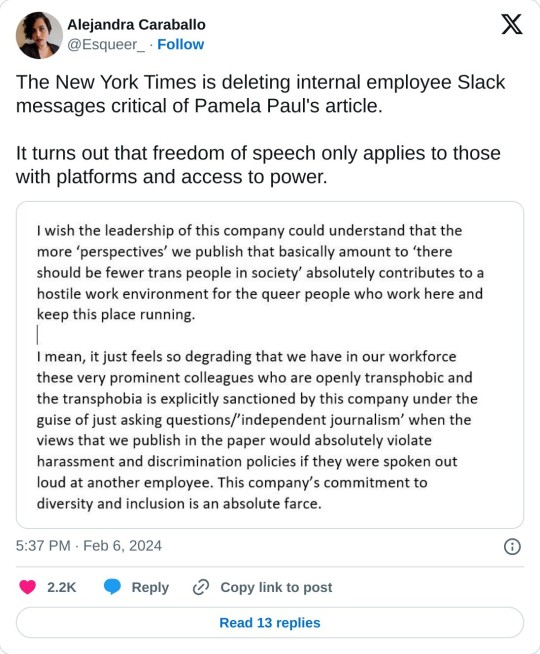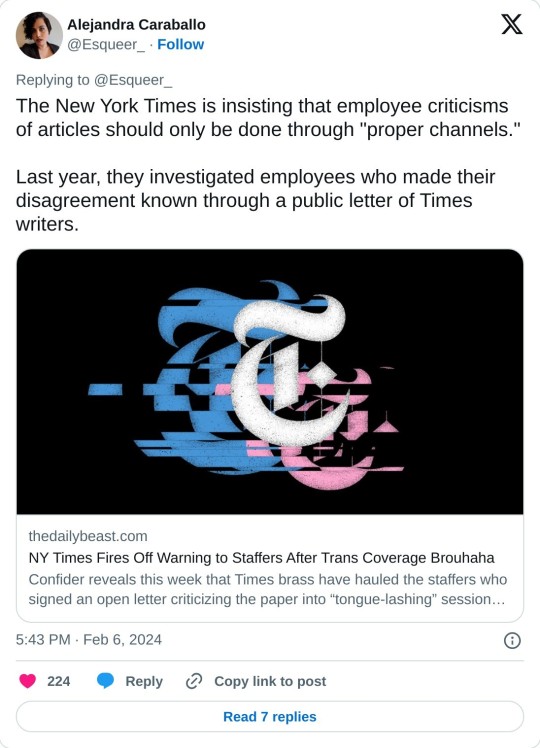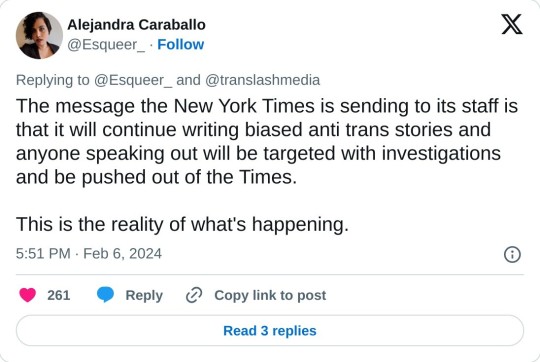#alejandra caraballo
Text
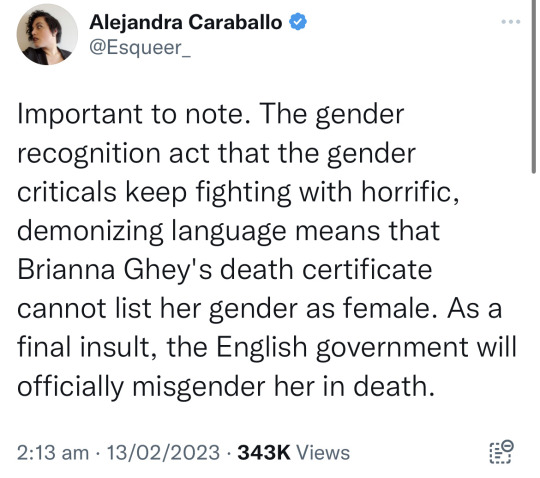
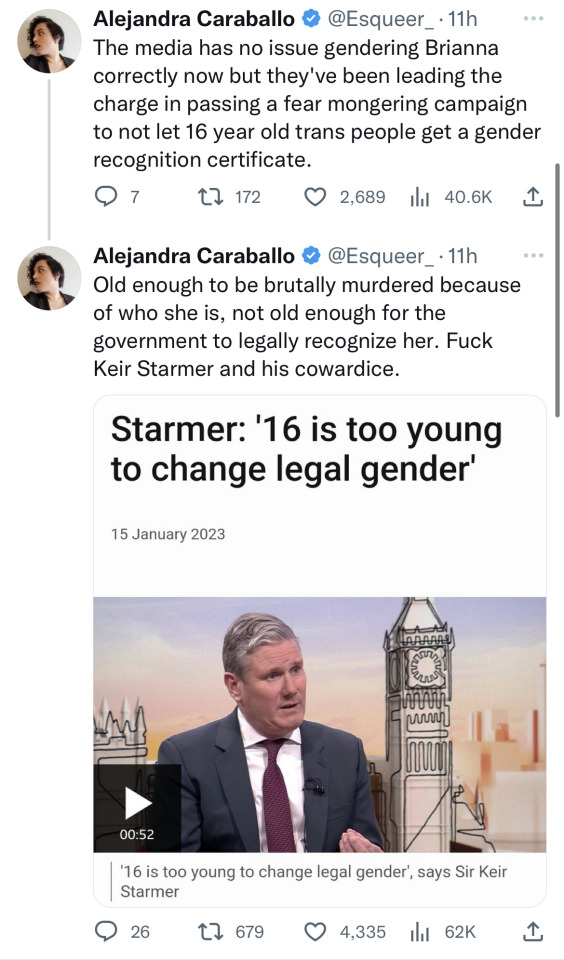
I unusually just share tweets, but given the amount of reblogs I'll edit this one:
INFO Update #1 from @misinfohunter
This is mostly misinformation.
UK law does not require transgender people to have a Gender Recognition Certificate in order to include their correct name and gender on a Death Certificate. However, this is subject to discretion and having a GRC does make the process less complicated.
HREF.LI
There is no English government. England is controlled by the UK government.
Why does England not have its own parliament?
Jack Sheldon, University of Cambridge, provide 'The Basics' on English devolution (or the lack of), explaining why England does not have a p
CENTRE ON CONSTITUTIONAL CHANGE
Sir Keir Starmer did voice the opinion that ‘16 is too young to decide legal gender’ during an interview on January 15th, 2023. This statement was made in reference to Scottish reforms to the Gender Recognition Act.
Starmer: '16 is too young to change legal gender' - BBC News
The UK Labour leader voices "concerns" about the Scottish government's reforms to the process.
BBC NEWS
INFO Update #2 from @momagainstcatboys
this is not true. i understand people are upset and the legislation is legit nightmarish but there is no legal requirement for your gender on your death certificate to match that on your birth certificate, nor do you need a gender recognition certificate. it merely requires that those registering the death note the correct gender with the registrar. obviously this legislation can be applied unevenly and families are bs but it’s important that people know their rights on this, and spreading misinformation helps no-one.
#alejandra caraballo#political twitter#brianna ghey#uk politics#uk law#keir starmer#updated post#updated 17/02/2023
3K notes
·
View notes
Text


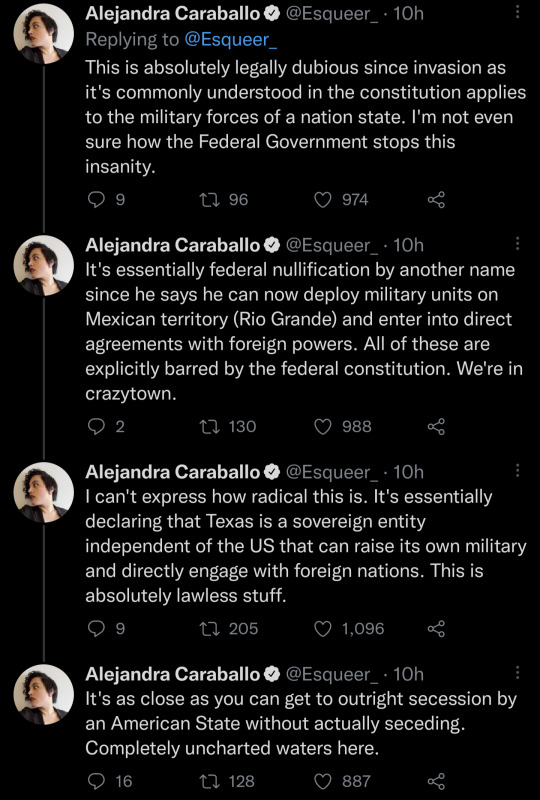
#us politics#news#2022#twitter#tweet#republicans#conservatives#gov. greg abbott#texas#invasion clause#texas national guard#immigrants#immigration#us constitution#texas constitution#national guard#texas department of public safety#alejandra caraballo#secession#us mexico border#mexico#drug cartels
3K notes
·
View notes
Text
An Arkansas lawmaker shocked onlookers this week when he asked a transgender health care professional about her genitals at a hearing on a bill that would prohibit gender-affirming care for minors.
Gwendolyn Herzig, a pharmacist who is a trans woman, was testifying Monday in support of the treatment for minors during a state Senate Judiciary Committee hearing.
“You said that you’re a trans woman?” Republican state Sen. Matt McKee asked Herzig. “Do you have a penis?”
The audience erupted, with some audibly gasping and at least one person shouting, "Disgraceful."
"That's horrible," Herzig said, after taking a few moments to gather herself. "I don't know what my rights are, but that question was horribly inappropriate."
Herzig, who holds a doctorate of pharmacy, then added: "I'm a health care professional, a doctor. Please treat me as such. Next question, please."
Herzig said she went into Monday's hearing hoping that Republican lawmakers would be receptive to hearing her perspective as a trans woman and a health professional.
"Any other question I was expecting other than what I got," Herzig, 33, said in a phone interview with NBC News. "It was probably the most publicly humiliating thing I've ever gone through."
McKee did not immediately respond to NBC News' request for comment.
The exchange prompted outrage on social media from trans activists and the state's Democrats.
"Absolutely sickening," Alejandra Caraballo, a clinical instructor at Harvard Law School’s Cyberlaw Clinic, wrote on Twitter. "Arkansas State senator Matt McKee asked a trans person at a legislative hearing 'do you have a penis?' Does this State Senator have any basic human decency?"
The Democratic Party of Arkansas tweeted, "Republicans are not hiding their transphobia."
The legislation, S.B. 199, introduced in the Arkansas Senate this month, would prohibit physicians in the state from providing most types of gender-affirming care to minors, including prescribing puberty blockers or hormone replacement therapy, or from performing transition-related surgeries.
It would also allow anyone in the state who has received gender-affirming care as a minor to file a malpractice lawsuit against physicians for up to 30 years after they turn 18.
More than a dozen major medical organizations, including the American Medical Association, the American Academy of Pediatrics and the American Psychological Association, support the treatments that would be barred if the bill becomes law.
In 2021, Arkansas became the first state to ban gender-affirming care for minors, but a federal judge temporarily blocked the law. The 2021 legislation largely mirrors the bill introduced this year.
Five other states have enacted similar forms of the legislation, including South Dakota, whose Governor signed a measure into law on Monday.
Less than two months into 2023, lawmakers in at least 24 states, including Arkansas, have introduced legislation that would restrict transition-related care for minors, according to an NBC News analysis.
S.B. 199 advanced through Arkansas' Senate Judiciary Committee on Monday, and it is expected to pass through the state Senate in upcoming weeks.
After testifying, Herzig said she defiantly sat through the rest of the hearing before heading back to work at the pharmacy she owns, Park West Pharmacy in Little Rock, the state capital.
As video of her exchange with McKee spreads on social media, Herzig said, "Going viral, I guess, is OK."
"I really just hope it just shows people that there's people like me who want to stand up and that there are people who want to make sure there are access to resources," she added.
#us politics#news#nbc news#2023#Arkansas#trans healthcare#trans healthcare ban#transphobia#republican homophobia#trans misogyny#Gwendolyn Herzig#Arkansas legislature#Matt McKee#republicans#conservatives#gop platform#gop policy#gop#alejandra caraballo#Democratic Party of Arkansas#sb 199#Arkansas Senate Judiciary Committee#Arkansas Senate
133 notes
·
View notes
Text
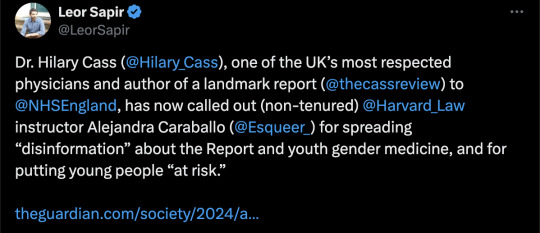
By: Sammy Gecsoyler
Published: Apr 21, 2024
The doctor behind a landmark review of the NHS’s gender identity services for children and young people has said fears had been raised about her personal safety amid online abuse after the report’s release.
Dr Hilary Cass told the Times she wished to address the “disinformation” circulating about the findings and recommendations handed down by the Cass review when it was published on 10 April.
She said she had received online abuse in the wake of the report and had been advised to stop using public transport.
The report said the evidence base for gender medicine in young people had been thin and children had been let down by a “toxic” public discourse around gender.
Cass told the Times: “I have been really frustrated by the criticisms, because it is straight disinformation. It is completely inaccurate.
“It started the day before the report came out when an influencer posted a picture of a list of papers that were apparently rejected because they were not randomised control trials.
“That list has absolutely nothing to do with either our report or any of the papers.”
Referring to the online abuse she had received, she said: “There are some pretty vile emails coming in at the moment, most of which my team is protecting me from, so I’m not getting to see them.”
She added: “I’m not going on public transport at the moment, following security advice, which is inconvenient.”
The report said the now shuttered Gender Identity Development Service (Gids) at the Tavistock and Portman NHS Foundation Trust, the only NHS gender identity development service for children in England and Wales, used puberty blockers and cross-sex hormones despite “remarkably weak evidence” that they improved the wellbeing of young people and concern they may harm health.
The report recommended that young people struggling with their gender identity should be screened to detect neurodevelopmental conditions and there should be an assessment of their mental health, because some who seek help with their gender identity may also have anxiety or depression, for example.
When the report was released, Cass stressed that her findings were not intended to undermine the validity of trans identities or challenge people’s right to transition, but rather to improve the care of the fast-growing number of children and young people with gender-related distress.
NHS England has since announced a second Cass review-style appraisal of adult gender clinics. Cass confirmed to the Times that she would not take part in the adult report after the abuse she suffered in recent weeks.
She said: “You heard it right here: I am not going to do the adult gender clinic review.”
--


==
"If someone doesn't value evidence, what evidence are you going to provide to prove that they should value it? If someone doesn’t value logic, what logical argument could you provide to show the importance of logic?"
-- Sam Harris
These gender ideologues are cultists. There's no science, no evidence, no reasoning that would convince them of reality, because they don't believe based on science, evidence or reality. They believe entirely on ideology and faith. Nothing will convince them that, wait, perhaps we got this wrong? Is there something we missed? Could this have gotten out of hand? Is there information we don't know about?
They don't care.
They do not care.
They don't care about truth. They don't care about people. They don't care about kids; they just use them as a shield from criticism. They don't care about anyone. They only care about their ideology of gender revolution and "queering" the world, no matter the cost, no matter who gets hurt along the way.
Never ever forget and never ever forgive. Make sure these lunatics are as notorious in history as Mengele and Lysenko.
#Leor Sapir#Dr. Hilary Cass#Hilary Cass#Cass Review#Cass Report#gender cult#disinformation#medical corruption#medical scandal#medical mutilation#gender affirming care#gender affirming healthcare#gender affirmation#queer theory#gender identity ideology#gender ideology#intersectional feminism#religion is a mental illness#Alejandra Caraballo#Erin Reed#Michael Hobbes#Evan Urquhart#pathological liars#known liars#gender fanatics#gender reckoning
13 notes
·
View notes
Text

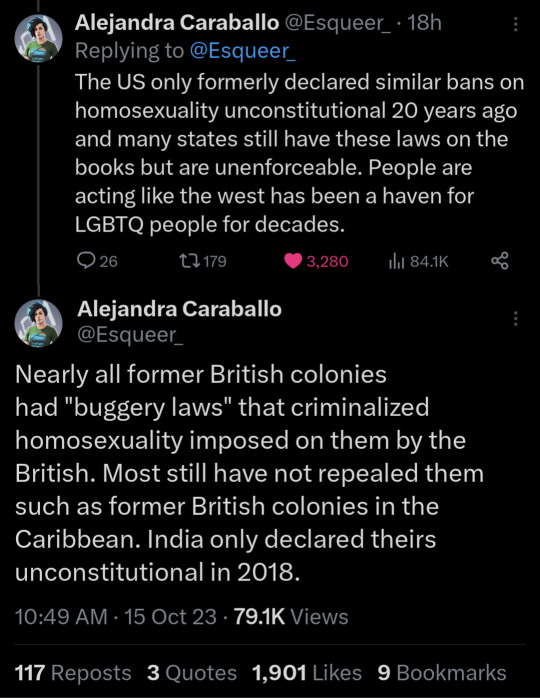
source
#alejandra caraballo#free Palestine#lgbtq community#LGBTQ rights#gay rights#trans rights#israel apartheid#genocide#lgbtq Palestine#palestinian lives matter#palestine under attack#Palestine will be free#fuck homophobia#western colonialism#fuck transphobes#death to Colonizers#gaza#Israel#palestine#homosexuality criminalized#LGBTQ laws
25 notes
·
View notes
Text
5 notes
·
View notes
Text
As usual, Elon's not smart or diligent enough in work ethic to have bothered to learn what words mean. He's always getting schooled by Alejandra.

2 notes
·
View notes
Text


Enjoined Document
12 notes
·
View notes
Link
A more detailed Followup on that Andrew Tate story from Alejandra Caraballo on Twitter. I don’t think she has a tumblr but if she does let me know and I’ll rb her post on it.
#Alejandra Caraballo#Twitter Threads#Greta Thunberg#Romania#Human Trafficking#Andrew Tate#Get Fucked you Fucking Chud#Conservatives#informative posts#link posts#Twitter
4 notes
·
View notes
Text
"The viral Twitter account LibsofTikTok promoted a lie about gender-affirming care at the hospital—and now doctors are getting death threats."
"Despite the outrage about the targeted harassment campaign against Boston Children’s Hospital and its staff, Raichik on Tuesday posted a similarly incendiary tweet targeting Phoenix Children’s Hospital.
“How many more children’s hospitals and their providers need to be threatened before you actually do something?” Alejandra Caraballo, a clinical instructor at the Harvard Law School Cyberlaw Clinic an LGBTQ+ advocate who has been at the forefront of calling out Raichik’s campaign, tweeted on Tuesday."
#trans rights are human rights#protect trans youth#lgbtqia#Alejandra Caraballo#Boston Children’s Hospital#Phoenix Children’s Hospital#fuck transphobes#transphobia#vice news
3 notes
·
View notes
Text
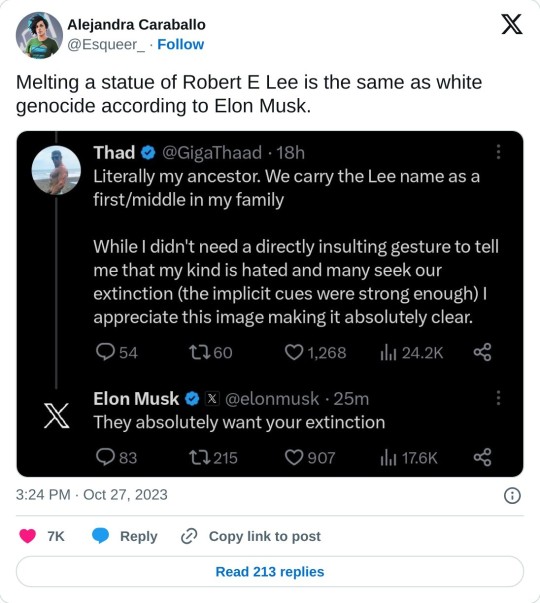
#us politics#republicans#conservatives#tweet#twitter#x#@esqueer_#alejandra caraballo#robert e. lee#confederate states of america#fuck the confederates#confederate pride#fuck the confederacy#confederate monuments#elon musk#fuck billionaires#eat the rich#2023
73 notes
·
View notes
Text
Ron DeSantis has appointed Tina Descovich, a co-founder of Southern Poverty Law Center-designated hate group Moms for Liberty, to the Florida Commission on Ethics.
DeSantis announced Descovich’s appointment to the prominent commission on Wednesday (6 September). The appointment is still subject to confirmation by Florida’s Republican-led Senate.
The nine-member panel is responsible for weighing complaints and investigating alleged breaches of public trust against elected and appointed officials as well as state employees.
Descovich wrote on X, formally known as Twitter, that it will be a “privilege to serve the state [she loves] as a member of this commission.”
However, Alejandra Caraballo, an LGBTQ+ rights advocate and civil rights attorney, warned that Descovich’s appointment was dangerous because she would “be able to investigate LGBTQ state employees and allies and systematically remove them from state government.”
DeSantis just appointed the co-founder of an SPLC designated hate group as part of the the Florida Ethics Commission.
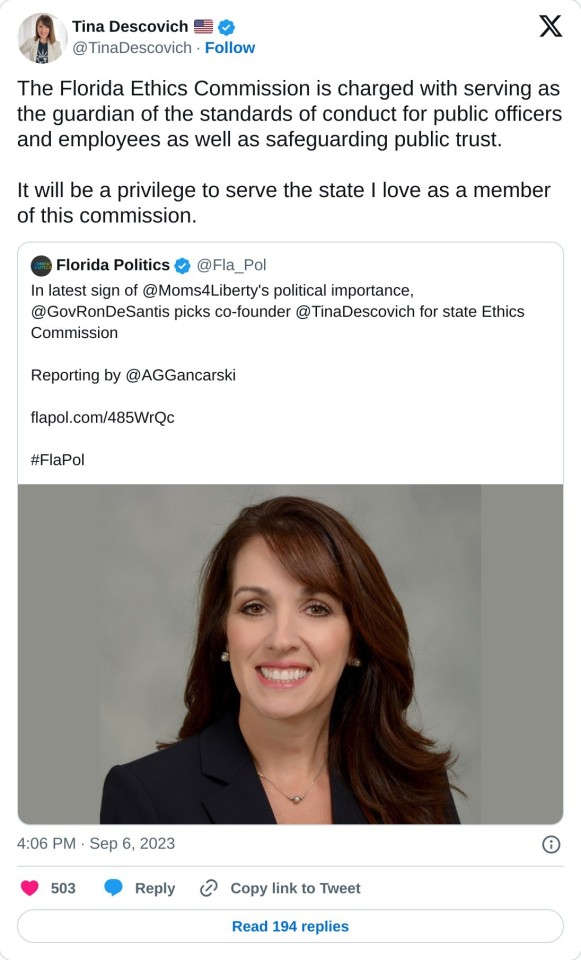
Descovich, who previously served on Brevard’s school board from 2016 to 2020, founded Moms for Liberty with Tiffany Justice in 2021 to “stand up for parental rights at all levels of government”, according to the group’s website.
The Southern Poverty Law Center (SPLC) labelled Moms for Liberty an “extremist group” because of its opposition to LGBTQ+ issues, advocacy for book bans and work against racially inclusive curriculums in schools.
“Moms for Liberty activities make it clear that the group’s primary goals are to fuel right-wing hysteria and to make the world a less comfortable or safe place for certain students – primarily those who are Black, LGBTQ or who come from LGBTQ families,” the SPLC’s 2022 Year in Hate and Extremism report stated.
The Florida-based group – which has chapters around the US – helped develop the state’s ‘Don’t Say Gay’ law and publicly advocated in favour of the legislation, which bans discussions of LGBTQ+ topics in schools.
In July 2022, Moms for Liberty’s Twitter (now X) account was temporarily suspended for violating the social media platform’s rule against hateful conduct with a post criticising California’s gender-affirming healthcare bill.
The post claimed that gender dysphoria is a “mental health disorder” and that “California kids are at extreme risk from predatory adults.”
Moms for Liberty also alleged on social media that “CRT” (critical race theory) and “gender ideology” are “toxic for children.” In another post, the group claimed that “gender identity indoctrination” is “one of the most dangerous threats facing children in America today.”
Moms for Liberty has also been tied to other far-right organisations, and members have allegedly waged campaigns of harassment against school boards or rival parent groups.
In one interview, a Moms for Liberty member said LGBTQ+ kids should be placed in separate classrooms “like children with autism or Down’s syndrome.”
The American Historical Association also has condemned Moms for Liberty’s ‘vigorous’ advocacy of “censorship and harassment of history teachers, banning history books from libraries and classrooms and legislation that renders it impossible for historians to teach with professional integrity without risking job loss and other penalties.”
The Committee on LGBTQ History said the right-wing group “consistently spreads harmful, hateful rhetoric about the LGBTQIA+ community, including popularising the use of the term ‘groomer’ to refer to queer people and attacking the mere existence of trans youth.”
#us politics#news#pinknews#2023#republicans#conservatives#alt right#Moms for Liberty#florida#gov. ron desantis#Florida Commission on Ethics#Tina Descovich#Alejandra Caraballo#republican homophobia#republican family values#southern poverty law center#gender affirming healthcare#gender affirming care#gender dysphoria#transphobia#hate groups#twitter#tweet#x
12 notes
·
View notes
Text
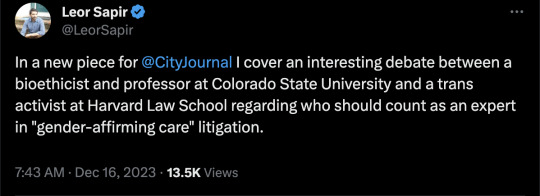
By: Leor Sapri
Published: Dec 15, 2023
The core question in lawsuits over state-level age restrictions on “gender-affirming care” or former patients suing their providers for fraud or malpractice is whether sex-trait modification is an evidence-based and ethical medical practice. Recognizing the limits of their own knowledge on such matters, judges have turned to expert witnesses to help them understand the key issues at play. But since both sides in these legal contests appoint expert witnesses to back their claims (typically medical doctors and mental-health professionals), judges must determine which are more credible.
A recent exchange between Moti Gorin, an associate professor of philosophy and bioethicist at Colorado State University, and Alejandra Caraballo, a transgender activist and cyberlaw instructor at Harvard Law School, provides crucial insight into how these questions bear on the outcome of lawsuits over gender medicine. In a paper titled “The Anti-Transgender Medical Expert Industry,” published earlier this year in the Journal of Law, Medicine & Ethics, Caraballo argues that judges should disregard the opinions of medical professionals who testify on behalf of states seeking to restrict “gender-affirming care.” In a newly published letter to the editor in the same journal, Gorin shows the fatal flaws in Caraballo’s arguments. (The journal also gave Caraballo the chance to respond to Gorin.)
Caraballo devotes considerable space to maligning experts and organizations skeptical or critical of “gender-affirming care” as being driven by “anti-transgender” animus. As Gorin points out, these are
serious allegations, directed at named entities and individuals, and presented not on a social media platform or in the opening statement of an attorney engaged in courtroom advocacy but in the pages of a peer-reviewed, academic journal. One should therefore expect strong evidence in support of such allegations, in keeping with the usual norms of academic publishing. Those norms require, inter alia, that easily-verifiable factual claims be true, that accurate and otherwise adequate citations be provided, that the author avoid unnecessarily inflammatory language, and so on.
Caraballo provides zero evidence for these accusations. For example, Caraballo describes Stephen Levine, a professor of psychiatry at Case Western Reserve University School of Medicine with five decades of clinical experience treating gender dysphoric patients, as “one of the most prolific anti-transgender medical expert [sic] in the country” and claims that he “has not published peer-reviewed research in the relevant field.” As Gorin observes, however, “It is easy to confirm that this claim is plainly false.” Levine, who chaired the HBIGDA’s (now WPATH) Fifth Standards of Care and served on the American Psychiatric Association’s DSM-IV Subcommittee on Gender Identity Disorders, has many peer-reviewed publications in the field, including landmark papers like “The Myth of ‘Reliable Research’” that touch directly on the evidence base for pediatric gender medicine.
Gorin provides other examples of blatant falsehoods in Caraballo’s paper, raising the question of how the Journal of Law, Medicine, & Ethics could allow such defamatory statements to be made in its pages without even minimal corroboration. As Gorin later explained on X, academic publishing relies on a certain degree of trust. Editors and reviewers assume that scholars will not, for instance, blatantly mischaracterize sources they cite, as Caraballo appears to have done. Recently, a prominent physician argued that the scandal of pediatric “gender-affirming care” was made possible due to a “broken chain of trust” within the medical and scientific establishment, with activist clinicians and researchers exploiting the chains of trust built up over generations by their professional forebearers. That physician is Stephen Levine.
No less embarrassing for Caraballo than the many factual errors in the original article is Caraballo’s apparent misunderstanding of the rules of evidence in adjudication. Here, Gorin takes Caraballo to task on the author's own turf and shows a superior grasp of the issues.
First, some context. Courts are generally a bad forum in which to settle scientific debates. Among other problems, judges are not subject-area experts and have little time to master the nuances of scientific controversies; they must inevitably decide between competing claims of subject-area experts. By definition, such contests require non-experts to substitute their own judgment for that of at least one expert—a scenario that can easily undermine the judge’s credibility in the eyes of scientific critics.
In the 1923 case Frye v. United States, the D.C. Court of Appeals opined that it was hard to determine when a “scientific principle or discovery crosses the line between the experimental and demonstrable stages,” and that, in order to do so, judges should consider whether a scientific principle or discovery has “gained general acceptance in the particular field in which it belongs.”
In 1975, Congress adopted the Federal Rules of Evidence. Rule 702 states, “If scientific, technical, or other specialized knowledge will assist the trier of fact to understand the evidence or to determine a fact in issue, a witness qualified as an expert by knowledge, skill, experience, training, or education, may testify thereto in the form of an opinion or otherwise.” In the 1993 case Daubert v. Merrell Dow Pharmaceuticals, Inc., the Supreme Court held that Rule 702 supersedes the Frye test of “general acceptance." The Court laid out four criteria to guide judges in their assessment of the reliability of expert testimony:
1. The expert’s scientific, technical, or other specialized knowledge will help the trier of fact to understand the evidence or to determine a fact in issue;
2. The testimony is based on sufficient facts or data;
3. The testimony is the product of reliable principles and methods; and
4. The expert has reliably applied the principles and methods to the facts of the case.
It’s easy to see how these doctrinal issues bear directly on the current debate over “gender-affirming care.” When advocates of gender-affirming care maintain that these controversial procedures are evidence-based, they cite the consensus of professional medical associations. Critics point out that this consensus is manufactured and enforced through suppression of contrary viewpoints. They point out that consensus-based medicine is not necessarily evidence-based medicine.
Caraballo’s position is that expert testimony from the likes of Levine and the psychologist James Cantor—author of the definitive, peer-reviewed fact-check of the American Academy of Pediatrics’ policy statement on “gender-affirming care”—should be discounted on the grounds that Levine and Cantor do not directly provide “gender-affirming” medical treatments to minors and that they operate outside the consensus of U.S. medical associations.
Regarding the first claim, if clinicians do not approve minors for puberty suppression, cross-sex hormones, or surgeries, that might be because they don’t believe that these interventions are evidence-based and ethical. Moreover, as Cantor has explained in expert witness testimony, the expertise of clinicians is different from that of scientists. The clinician’s expertise “regards applying general principles to the care of an individual patient and the unique features of that case.” The scientist’s expertise “is the reverse, accumulating information about many individual cases and identifying the generalizable principles that may be applied to all cases.” Accordingly, Cantor writes, “In legal matters, the most familiar situation pertains to whether a given clinician correctly employed relevant clinical standards. Often, it is other clinicians who practice in that field who will be best equipped to speak to that question. When it is the clinical standards that are themselves in question, however, it is the experts in the assessment of scientific studies who are the relevant experts.” For good reason, Caraballo’s criterion—that a doctor must practice a type of intervention in order to qualify as an expert in the evidence base for that intervention—is neither mentioned nor implied in the Daubert standards.
Not just that, but clinicians who practice “gender-affirming care” are likely to find themselves in intellectual, professional, and financial conflicts of interest, which may produce confirmation bias and impair their ability to dispassionately assess the evidence for the care they provide.
In short, Caraballo’s characterization of who counts as an expert is a classic example of the No True Scotsman fallacy. Caraballo conveniently defines as “experts” only those who practice, and by implication agree with, “gender-affirming care” for kids. It would be as if we agreed to define only clinicians who practice lobotomy as “experts” on whether lobotomy is an evidence-based practice.
As for Caraballo’s second point, about “anti-transgender” experts being outside the consensus in the field, Gorin points out that, under Daubert, this should not disqualify the opinions of these experts. To recall, the court in Daubert explicitlyrejected the “general acceptance” standard in Frye as a prerequisite for determining the reliability of testimony. “It is easy to see why ‘general acceptance’ is too strict a requirement,” writes Gorin. “It would exclude from the start expert testimony that, despite being inconsistent with generally-held opinion or consensus, proves to be consistent with the truth.” Commitment to science means above all commitment to the scientific method. As the Court put it in Daubert, “The focus . . . must be solely on principles and methodology, not on the conclusions they generate.”
Caraballo’s typo-riddled response to Gorin’s criticism complains that he is “hyper fixat[ed] on minor errors rather than the broader argument.” (In fact, Gorin’s examples of Caraballo’s factual errors go to the heart of Caraballo’s thesis that the experts in question are driven by animus rather than good-faith disagreement with the prevailing consensus.) Caraballo then resorts to more mudslinging and name-calling, for instance characterizing Levine as a “conversion therapist” because he uses exploratory therapy for his pediatric patients rather than automatically “affirming” their self-diagnosed “gender identity” as permanent and eligible for hormonal treatments. To support the accusation, Caraballo cites a paper by a transgender bioethicist who opposes “gatekeeping” for drugs and surgeries on the grounds that teenagers should have the right to turn their bodies into “gendered art pieces.”
Caraballo then continues to impugn the motives of “anti-transgender” expert witnesses by claiming that they are paid for their work—an unremarkable observation and one that conveniently ignores the fact that experts on the other side are also paid. For example, Jack Turban is paid up to $400 per hour to testify against state age-restriction laws. (It was money well spent: Turban revealed that he does not understand the basics of evidence-based medicine.)
Speaking of ulterior motives: in a footnote, Caraballo discloses that “these witnesses provided a report that impacted my ability to access care when I visit family in Florida. I can no longer obtain refills there legally due to restrictions placed on adult care. Additionally, my care in Massachusetts has been severely affected by the large influx of trans people fleeing states such as Florida. While this may be an elective academic indulgence for Gorin, this affects my healthcare directly.”
Caraballo ends by wondering, “Why should gender affirming care be considered differently where non-practitioners of a field testify on the relevant standards, they themselves do not practice?”
The answer is simple: those who provide irreversible, sterilizing, and often disfiguring “treatments” to kids on the belief that these young people were “born in the wrong body” are ideologues who need to be reined in by their more professional colleagues. For Caraballo, apparently, only blood-letters should testify on the merits of blood-letting.
==
When activists get desperate, their lies get more egregious.
Caraballo needs to return his law degree. He's dangerously unqualified.
#Leor Sapir#Alejandra Caraballo#Moti Gorin#evidence based medicine#gender ideology#queer theory#fallacies#logical fallacies#medical malpractice#medical scandal#medical corruption#gender affirming care#gender affirming healthcare#affirmation model#expert testimony#religion is a mental illness
7 notes
·
View notes
Photo


terfs cause this. chaya raichik caused this. fox news caused this. all of the rightwing media on youtube caused this. fascists caused this. transphobia and homophobia caused this.
#trans rights#trans day of revenge#trans day of remembrance#trans rights are human rights#lgbtq#lgbt#lgbtqiap#lgbtq rights#queer liberation#trans liberation#fuck transphobia#transgender violence#fuck terfs#fuck fascism#club q shooting#colorado springs#colorado#alejandra caraballo
127 notes
·
View notes
Text
It’s true. I’ve seen Elon fume and obsess against Alejandra Caraballo on multiple occasions. His hatred of her drives his changes to Twitter policy.

2 notes
·
View notes
